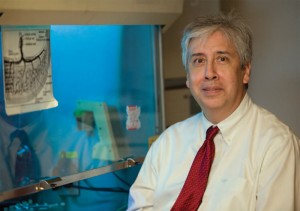By Lindsay Steele
The Catholic Messenger
Cellular Engineering Technologies, Inc. (CET), a biotechnology company based in Coralville, and the John Paul II Medical Research Institute (JP2MRI), a nonprofit based in Iowa City, are conducting research to help deliver personalized medical care and research to cancer patients.

Dr. Alan Moy poses for a photograph at his medical research laboratory in Coralville. A parishioner of St. Mary in Iowa City, Moy adheres to Catholic pro-life values in his cancer research.
Dr. Alan Moy, a member of St. Mary Parish in Iowa City, founded CET in 2000. The company strictly adheres to Catholic pro-life values in its research by refusing to use aborted tissue or embryonic stem cells. “We want to prove to the world that one can … solve complex health problems for patients without having to sacrifice one’s medical ethics.”
Dr. Moy said one problem with traditional cancer treatment is that it is often a one-size-fits-all approach. “Chemotherapy has serious side effects and is frequently administered without any rigorous testing to specifically identify which cancer drugs will be effective or not,” says Dr. Moy.
CET has developed technology that allows the company to purify and grow cancer cells, which can ultimately be used to directly test chemotherapy and create cancer vaccines. Fresh tissue samples from participating patients at Mercy Hospital of Iowa City will be sent to CET for developing a personalized “cancer in a dish” subject for drug testing. Personalized cancer cells from patients can be subjected to current and emerging chemotherapy drugs to determine which drugs are effective or ineffective and at what specific doses for treatment.
“It’s taken years of trial and failure and persistence to find out what it takes to keep cancer cells thriving once taken from a patient,” Dr. Moy said.
“Cancer grows great in the body, but once taken out of the body, it dies easily because it requires complex nutritional requirements. We were able to figure a universal system for most solid tumors.”
From an economic standpoint, he hopes the research will help to create a new paradigm which will allow patients to experience cheaper, more effective care. He said cancer patients represent 1 percent of those receiving healthcare, but require about 10 percent of the budget. He fears that could lead to compromised care in the future. “If you can more accurately identify which drugs they should avoid, and that would have unnecessary side effects, then you can help reduce the cost.”
Jay Kamath, CEO of the John Paul II Medical Research Institute (JP2MRI) said cancer patients have a narrow window to benefit from the program.
Patients who are anticipating cancer surgery or diagnostic biopsies should contact the Institute and be further evaluated. Hospitals typically discard cancer tissue or place it in fixatives that kill cells, making it impossible to then isolate and grow cancer cells.
Mercy Hospital of Iowa City is the only Iowa hospital presently set up for this research. Patients who are interested in providing their tissue or tumor specimens and become involved in the Institute’s research efforts are encouraged to contact the John Paul II Medical Research Institute (319) 688-7367 to learn how they can participate in the program.
JP2MRI is currently seeking $250,000 in donations to offset the cost of the research. Donations may be made online at http://www.jp2mri.org/capital-campaign.htm, or mail a check payable to John Paul II Medical Research Institute, 540 E. Jefferson St. Ste 305, Iowa City, IA 52245.








